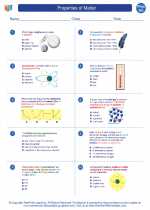Colloids
A colloid is a type of mixture in which one substance is dispersed in another. In a colloid, the particles of the dispersed substance are larger than the individual particles of the solvent, but they are still small enough that they do not settle out. Colloids are also known as colloidal dispersions or colloidal systems.
Types of Colloids
Colloids can be classified into several types based on the phases of the dispersed and dispersing substances:
- Sol: A colloid in which the dispersed phase is a solid and the dispersing medium is a liquid. An example of this is paint.
- Gel: A colloid in which the dispersed phase is a solid and the dispersing medium is a solid or a liquid. Examples include jelly and agar-agar.
- Emulsion: A colloid in which the dispersed phase is a liquid and the dispersing medium is a liquid. Examples include milk and mayonnaise.
- Aerosol: A colloid in which the dispersed phase is a solid or liquid and the dispersing medium is a gas. Examples include fog and smoke.
Properties of Colloids
Colloids exhibit several unique properties, including:
- Brownian Motion: The particles of the dispersed phase in a colloid are in constant, random motion due to collisions with the molecules of the dispersing medium.
- Tyndall Effect: When a beam of light passes through a colloid, the light is scattered by the particles, making the beam visible. This is known as the Tyndall effect.
- Stability: Colloids are generally stable and do not settle out due to the presence of repulsive forces between the particles.
Applications of Colloids
Colloids have numerous practical applications in various fields, including:
- Food Industry: Colloids are used in the production of foods such as mayonnaise, ice cream, and cheese.
- Medicine: Colloids are used in drug delivery systems and medical imaging techniques.
- Environmental Science: Colloids play a role in processes such as soil formation and water purification.
- Manufacturing: Colloids are used in the production of paints, inks, and cosmetics.
Study Guide
When studying colloids, be sure to focus on the following key points:
- Definition and classification of colloids.
- Properties of colloids, including brownian motion and the Tyndall effect.
- Applications of colloids in various fields.
Additionally, it is important to understand the factors that affect the stability of colloids, such as the nature of the dispersed phase and the dispersing medium, as well as the presence of electrolytes and surfactants.
Be prepared to differentiate between colloids and other types of mixtures, such as solutions and suspensions.
Finally, practice identifying examples of colloids in everyday life and understanding their significance in different contexts.
By mastering the concepts and applications of colloids, you will gain a deeper understanding of the role of these unique mixtures in the world around you.
[Colloids] Related Worksheets and Study Guides:
.◂Physics Worksheets and Study Guides High School. Properties of Matter

 Worksheet/Answer key
Worksheet/Answer key
 Worksheet/Answer key
Worksheet/Answer key
 Worksheet/Answer key
Worksheet/Answer key
